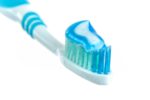
Chemical found in soap and toothpaste – triclosan – linked to osteoporosis in women
 Triclosan – an antibacterial and antifungal chemical – is added to some soaps, toothpastes and cosmetics to reduce or prevent the growth of bacteria and fungi.
Triclosan – an antibacterial and antifungal chemical – is added to some soaps, toothpastes and cosmetics to reduce or prevent the growth of bacteria and fungi.
A new study in the Journal of Clinical Endocrinology and Metabolism, recently looked at the association between exposure to triclosan and bone density. The scientists involved analysed data from 1,848 women and found that those with higher levels of triclosan in their urine were more likely to be at risk of osteoporosis.
But the effect of triclosan on bone density was small and it wasn’t clear whether other factors could have been the cause.
“The study’s design meant it could only show a potential link between triclosan and osteoporosis, but couldn’t prove that the triclosan was responsible for the lower bone density or that using it makes you more likely to have broken bones,” says Sarah Leyland from the Royal Osteoporosis Society. “This type of study is useful because it highlights potential risk factors, but more research is needed to prove that the findings are significant for our bones.
“In short, this study doesn’t provide strong evidence to say that you should avoid using products containing triclosan, so there’s no need to replace any of the products you have at home because of concerns about effects on your bones.”
Arthritis Digest Magazine was selected by Feedspot as one of the Top 5 Arthritis Blogs on the internet in 2018.
For more in-depth features, interviews and information, subscribe to Arthritis Digest magazine, a popular title that’s published six times a year. Click here for the digital version or tel 0845 643 8470 to order your had copy. You’ll know what your doctor is talking about, what new drugs are in the pipeline and be up to date on helpful products.
